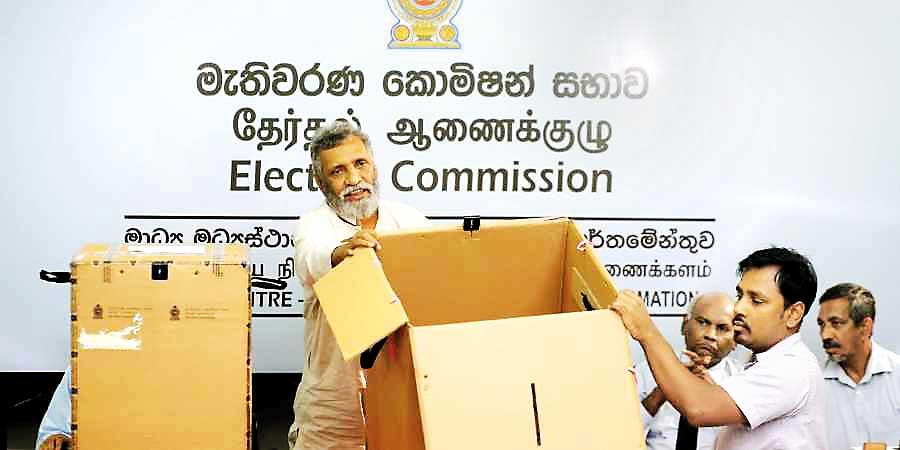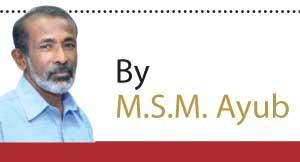Reply To:
Name - Reply Comment
Last Updated : 2024-04-20 00:00:00

- Many suggestions in line with political allegiance and not genuine efforts to resolve constitutional crisis
- Opposition argues President can avert lurking constitutional crisis by reconvening Parliament
- Medical perception is that incubation period of coronavirus ranges from one to 14 days
We understand why the National Elections Commission (NEC) indefinitely postponed the general election that was scheduled for April 25 -- it was nothing but the heightening of the COVID-19 threat. Later on April 20, the NEC set the new date of June 20 for the poll. That may be on the inference that the coronavirus threat might ease by mid-May and contesting political parties and independent groups would be able to launch their campaigns henceforth.
Yet, we laymen are unable to fathom the legal ground on which the NEC had set June 20 for the election, since the Constitution requires the new Parliament to meet before June 2 as President Gotabaya Rajapaksa dissolved Parliament on March 2. This is clearly a constitutional crisis. 
Now, many people including politicians, lawyers and civil society activists make various suggestions to clear up this mess. However, almost all those suggestions seem to be in line with their respective political allegiance and agendas and not genuine efforts to resolve the issue.
It is a well-known fact that the Sri Lanka Podujana Peramuna (SLPP) led by former President Mahinda Rajapaksa wanted to dissolve Parliament as early as possible, since its candidate Gotabaya Rajapaksa won the presidential election on November 16 last year. And the President was expected to do so at the first instance he is permitted by the Constitution -- he set April 25 as the date for the parliamentary election.
Even after the first Lankan was tested positive for COVID-19 on March 11 and more patients were detected on subsequent days, government leaders seemed hell bent on holding the election as scheduled. Thus, ludicrously, March 16 was initially declared a holiday for the public sector in view of the virus threat, despite all schools being closed for a month on March 12. JVP leader Anura Kumara Dissanayake accused that government leaders wanted the public sector offices kept open as nominations for the election were scheduled for March 19. He alleged the government was more interested in holding the election than saving the lives of people from the pandemic.
The general medical perception is that the incubation period of novel coronavirus -- the time between catching the virus and beginning to show symptoms of the disease -- range from one to 14 days. Since the idea behind the holiday, curfew and lockdown was to isolate families from one another to allow symptoms to appear on those who had contracted the virus, a day’s holiday was seen ridiculous.
Hence, with mounting pressure, the government declared another three days from March 17 as public holidays, but without disrupting the nomination process. After accepting nominations on March 19, NEC Chairman Mahinda Deshapriya said the election could not be held on April 25 as declared by the President. At the same day, the government declared a work-from-home week from March 20. With more COVID-19 patients being reported, the government had to impose police curfew in all districts which overshadowed the election.
However, the issue resurfaced with a letter being sent by the NEC Chairman to the President on April 2 informing the latter to seek the opinion of the Supreme Court on holding the election in the light of the pandemic situation, but it was declined on the grounds that it was the NEC that had to decide on the poll. The issue eclipsed again by coronavirus but the government’s interest in holding the election emerged with a statement by Prime Minister Mahinda Rajapaksa who said on April 18 the NEC had no authority to postpone the election without announcing an alternative date.
This was seen as a call for the NEC to fix a date for the election. Nevertheless, no government leader made this point when the NEC Chairman indefinitely postponed the election on March 19.
A cold war on holding the election between opposition parties and the government gradually developed with the politicians of the government, pro-government media and analysts floating various arguments, insisting that the election be held soon while the opposition accusing the government of attempting to put the lives of people in danger by holding the poll. The government and its allies seemed to attempt to hold the election by the end of May so that the new Parliament could meet on June 2 thereby averting a constitutional crisis.
Meanwhile, parties and groups in the opposition vehemently opposed to an election in May citing the virus threat. This position put pro-government parties and groups in a tight corner. Hence, they suggested holding the election on a staggered basis instead of holding it on one day. This is, in a way, an attempt to take advantage of the situation as a staggered election would be more favourable to the ruling party than the opposition.
In fact, there is no difference in holding the election on a single day or on a staggered basis when it comes to the safety of voters or officials who are on election duty. Even if the NEC decides to hold the election on several days, polling booths have to be set up in the same places as planned, including in high-risk areas. Taking thousands of voters in those areas to other localities for voting would endanger their lives and those of others. On the other hand, the NEC cannot deploy the same group of officials to so many districts.
Parties in the opposition argued that the President could reconvene Parliament, which was dissolved on March 2, if the government faced any legal issue in obtaining funds from the Consolidated Fund to combat COVID-19. However, the President in a televised interview with his adviser and former President’s Secretary Lalith Weeratunga on April 23 said he was not prepared to reconvene the dissolved Parliament.
The NEC Chairman who was in favour of the idea to hold the election in May had suggested it to Professor Ratnajeevan Hoole, who is one of the three members of the NEC, on April 16 but the latter who was then in Jaffna flatly rejected it with a long letter to the former. Professor Hoole had pointed out the practical side of the suggestion including the danger it may pose to the officials on election duty. Finally, the NEC fixed June 20 as the new date for the election.
Although there is no assurance that COVID-19 would be eradicated or the threat would ease by mid-May or at least early June for political parties to start their campaigns and for the NEC to be assured of the safety of its officials, the opposition parties now seem content on the new date as they have defeated the government in the first round of the cold war. Now, they have launched another campaign to pressure the President to reconvene Parliament.
Tamil National Alliance (TNA) Spokesman and former Parliamentarian M.A.Sumanthiran has put forward an interesting argument on the current situation. He says with the NEC fixing June 20 as the date of the election, the President’s proclamation on the dissolution has been invalidated and that the old Parliament is now valid. However, the question remains on what basis then the country should go for an election on June 20 if the dissolution is invalid. Parliament should then be valid until September 2 or till the President dissolves it again.
However, one has to accept the argument by the opposition that the President could avert a lurking constitutional crisis by reconvening the old Parliament. Yet, how long can the country go on without holding an election, especially in view of the government having no majority, if the virus threat lasts for another year? Even if one argues that the old Parliament is valid until it automatically stands dissolved on September 2, what would be the situation after that, if the COVID-19 threat persists? Similarly, can a government put the lives of people at risk for the election? Since this is a life-threatening situation, leaders of all political parties and groups have to put their heads together and resolve it, casting aside the greed for power.

Add comment
Comments will be edited (grammar, spelling and slang) and authorized at the discretion of Daily Mirror online. The website also has the right not to publish selected comments.
Reply To:
Name - Reply Comment
On March 26, a couple arriving from Thailand was arrested with 88 live animal
According to villagers from Naula-Moragolla out of 105 families 80 can afford
Is the situation in Sri Lanka so grim that locals harbour hope that they coul
A recent post on social media revealed that three purple-faced langurs near t